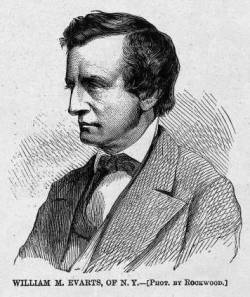| William
Evarts was born in Boston, Massachusetts, the son of a clergyman. In 1837, he graduated
from Yale, then studied law at Harvard before being admitted to the New York bar in 1840.
He became one of nation’ s leading lawyers, and served as U. S. Attorney for the
District of New York, 1847-1853. During the Civil War, President Lincoln sent him twice to
Great Britain in order to convince the British not to construct ships for use by the
Confederate navy. In 1868, President Johnson chose Evarts as a member of his defense
team during the President’s removal trial in the Senate. The lawyer had been
suggested by Secretary of State William Seward, a fellow-Republican and friend from New
York. In mid-April, the President privately expressed his dissatisfaction with Evarts,
whom he thought had let House prosecutor Benjamin Butler get away with character
assassination. By early May, however, an emotionally rejuvenated Johnson concluded that he
was "greatly pleased with Evarts’ efforts." A talented orator, he gave a
four-day summation at the trial. Following the President’s acquittal, Johnson named
Evarts Attorney General, again at Seward’s suggestion, after the Senate had rejected
the reappointment of Stanbery. This time, the Senate approved the President’s choice.
In 1871-1872, Evarts was appointed by President Grant as the United States counsel at
the Geneva Arbitration of the Alabama Claims. In 1875, he was the principal lawyer in the
sensational Tilton-Beecher adultery trial. During the electoral college controversy of
1877, Evarts served as counsel for the Republicans. After President Rutherford B. Hayes
took office in March 1877, he appointed Evarts Secretary of State. In 1885-1891, Evarts
represented New York in the U. S. Senate. He died in New York City.
Robert C. Kennedy, HarpWeek
Source consulted: Harper’s
Encyclopedia of United States History; William Degregorio, The Complete Book of U.S.
Presidents; Albert Castel, The Presidency of Andrew Johnson; and "William M.
Evarts" on the cyberschool website. |
|

William Maxwell Evarts
(6 February 1818 - 28 February 1901)
Source: Harper's Weekly
|